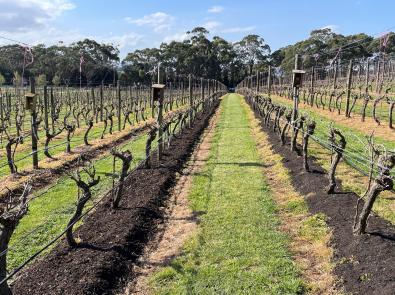Enhancing adoption of recycled green waste in vineyards (Macedon Ranges)
This three-year project in the Macedon Ranges is investigating the financial and environmental benefits of using urban recycled green waste as a mulch and compost under vines.
Two vineyards are testing certified mulch and compost in vine rows compared to a control row using standard practices (brush cutting and herbicide under vine).
Electronic data loggers monitor hourly progress, while the assessment of grape quality takes place during every annual harvest.
Why this project is important
The Macedon Ranges vineyards are the coldest in mainland Australia and produce outstanding cool climate wines. These highly labour-intensive vineyards need a reliable method to increase the time vine roots and grapes can spend at beneficial temperatures with cost-effective and efficient management practices.
Research shows that in mulched vines, roots and bunch zones were warmer in spring and cooler in summer and the nutrient supply and moisture preservation with mulch resulted in healthier vines and higher grape yield.
The concept is based on trials undertaken on the Mornington Peninsula between 2015 and 2018, which saw positive grape quality results in Pinot noir with recycled composted mulch under vine.
Results
The results from this project are now available as a case study, including a full cost-benefit to support growers with decisions about using recycled organic waste under vine and the potential yield increases.
Recycled mulch calculator: how much do I need?
An electronic mulch calculator is available for vineyards to calculate how much mulch is needed for the under vine area.
Volume of mulch required per 1m row
Mulch cover volume per hectare
Your cost of product
Project partners
- Sustainability Victoria
- Macedon Ranges Vignerons Association
- GrapeLinks
- BioGro
Funding acknowledgement
This project is delivered by Melbourne Water in partnership with Macedon Ranges Vignerons Association, and GrapeLinks, and is supported by the Victorian Government.
It is funded through Sustainability Victoria (Circular Economy Markets Fund-Organics).
